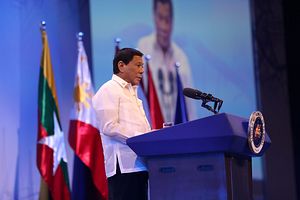Earlier this month, Philippine Defense Secretary Delfin Lorenzana paid a visit to Mongolia which included engagements tied to the defense realm of the bilateral relationship. Though Lorenzana’s interactions were part of a broader trip and few specifics have been publicly disclosed about what the two sides agreed to, his visit nonetheless shed some light on developments in the defense aspect of ties between the two Asian states under President Rodrigo Duterte.
Though the Philippine-Mongolia relationship technically dates back to 1973, until recently, ties had remained quite underdeveloped, including in more basic areas such as trade and investment as well as on the defense side. But bilateral relations have been getting gradually greater attention over the past few years.
That trend has continued on with Duterte’s presidency thus far. During a meeting between Duterte and Mongolian Prime Minister Jargatulgyn Erdenebat last May, the two sides agreed to develop several areas of cooperation, including trade, agriculture, and tourism, as well as enhancing and institutionalizing various engagements and mechanisms. There was also a focus on the significance of bilateral ties for the wider region, since the Philippines was at the time the holder of the annually rotating ASEAN chairmanship.
Earlier this month, the defense realm of the bilateral relationship was in the headlines when Philippine Defense Secretary Delfin Lorenzana visited Mongolia. The bilateral engagements Lorenzana had there were part of a broader trip that also included his participation in the Asian Ministerial Conference for Disaster Risk Reduction (AMCDRR) that was being held in the Mongolian capital of Ulanbaatar.
Lorenzana’s bilateral engagements included consultations with Mongolian defense officials including his Mongolian counterpart N. Enkhbold on July 6. According to local media reports, both sides reinforced the significance of their defense relations from a bilateral and regional perspective and also discussed the current state of their defense ties, including areas with which they could learn from and share experiences.
They also reportedly talked about ways they might broaden and deepen bilateral cooperation. These included areas such as training, peacekeeping operations, exercises at various levels, and information sharing on regional defense and security issues.
Few additional specifics were publicly disclosed by both sides in terms of what they had agreed to or what developments we could see thereafter. Nonetheless, the next steps that the two countries take on the defense side will be interesting to observe within the context of their broader bilateral relationship which still remains quite underdeveloped.

































